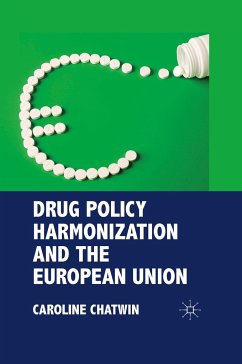
Anti-Drugs Policies of the European Union
Transnational Decision-Making and the Politics of Expertise
Versandkostenfrei!
Versandfertig in 6-10 Tagen
38,99 €
inkl. MwSt.
Weitere Ausgaben:

PAYBACK Punkte
19 °P sammeln!
Martin Elvins' book is the first to trace the evolution of anti-drugs policies at European Union level from the late 1960s to the present. Phases of drug policy development, key policy actors and institutions are described with particular reference to the influence of transnational networks of expertise. Policy development is placed in the context of both European integration and a broad harmonization of international policies against drug trafficking. Concerns are also raised about secretive and anti-democratic features on intergovernmental EU decision-making.














